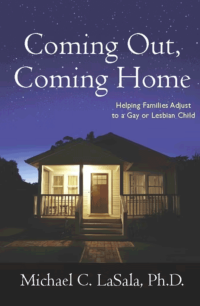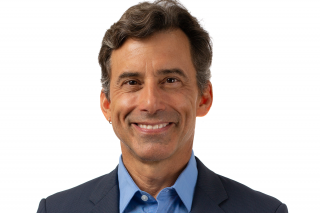Can you tell us under what circumstances you “came out?”
Coming out is a continuous, lifelong process. I have been out since age nineteen, and I am now in my sixties. However, every time I am in a new situation with new people, referring to or introducing my husband (as one example), I am coming out.
I recognized my same-sex attractions at a very young age (four or five years old), without knowing what they meant. As a child, my behaviors and interests were considered feminine, and as a result, I experienced a lot of verbal and physical harassment from peers. My family, fearing that I was gay, bullied me and steered me away from what they believed were my feminine interests, like cooking and playing with dolls. At age eighteen, I realized that my attractions and interests meant I was gay. For many of us, it is particularly painful to come to the realization that everything you were being bullied about as a child — that stigmatized identity — is actually who you are.
Like many other LGBTQ+ persons, a significant and particularly painful milestone was when I came out to my parents. College is a time of firsts, and during my first year at a university in upstate New York, I had my first romantic relationship and joined what was then called a gay alliance group for social and political action purposes. I subscribed to a political periodical out of Boston called Gay Community News and responded to an advertisement from an incarcerated gay man looking for pen pals. Within a short period, his letters became pornographic and he began asking for money, so I stopped writing but kept the letters. As luck would have it, my snoopy little brother found the letters and showed them to my parents, and that’s how I came out. So, not only was their good little boy gay, but he was dating a convicted criminal, and they also got a primer on explicit gay sex. Initially, they told me they would rather me tell them I was a murderer, which was not an uncommon parental reaction at the time.
What do you find most significant about your personal story?

Although I have experienced physical and verbal violence (including a death threat) related to my sexual orientation, I have never seen myself as a victim. First of all, being a young gay man in New York City during the pre-AIDS era, disco Studio 54 was a lot of fun (and honey, I’ve got stories!) Further, and more importantly, the traumatic experiences set the groundwork for my professional life. For over twenty-five years, I have provided counseling for LGBTQ+ people and their families, and the majority of my scholarship has centered on this population, including my first book: Coming Out, Coming Home: Helping Families Adjust to a Gay or Lesbian Child (Columbia University Press, 2010).
I remember being told that gay relationships don’t last, but I have been with my husband for forty-two years. We officially married ten years ago, and this relationship is extremely meaningful on so many personal and political levels.
Are there any historical or celebrated individuals who inspired you along your own journey?
I love writing, words, and wit, so Oscar Wilde, James Baldwin, Truman Capote, and Dan Savage were inspirational to me. Also, I must include the queer theorists John Rechy, Michael Warner, and Eve Sedgwick, as well as the celebrities Laverne Cox, Janet Mock, Ellen DeGeneres, Anderson Cooper, and Madonna. Finally, I derive inspiration from our past and present “out” activists, trailblazers, and politicians, such as Bayard Rustin, Christine Jorgensen, Larry Kramer, Barney Frank, and Pete Buttigieg. A new hero of mine is writer Harper Steele, and I highly recommend the documentary film in which she appeared, Will & Harper (dir. Josh Greenbaum, 2024). But please note that this list is far from exhaustive.
How do you feel about playing a leading role at Simmons University, a women-centered institution in which approximately 40% of students identify as LGBTQ+?
I am amazed, moved, and inspired by these Simmons students. Their presence reflects not only the progress we have made as a movement but also their bravery and character. In addition, it is a testament to Simmons as a place that not only welcomes but embraces queerness and LGBTQ+ people. I just started here in July 2024 and am so happy to be here.
How will you celebrate National Coming Out Day this year?
National Coming Out Day happens to coincide with the Jewish Holiday of Yom Kippur, a time of contemplation, so I will reflect on how far we have come as a group and on the battle ahead. There has been a backward movement in terms of book banning and healthcare limitations that directly affect our community, so we must be prepared to press on.
What words of advice do you have for young people who want to claim their sexual identity?
I always tell my clients that the norms and values of our society around sex and gender are wrong, and as an LGBTQ+ person, you cannot fully love yourself until you come to this realization. In addition, there is a great, fun community out there, so find your people. We are waiting for you!

